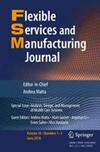Integrated maintenance and production scheduling for unrelated parallel machines with setup times
IF 2.5
3区 工程技术
Q2 ENGINEERING, INDUSTRIAL
引用次数: 1
Abstract
Abstract This paper considers jointly scheduling the production and resource-constrained maintenance activities in a manufacturing setting with unrelated parallel machines. In particular, a single maintenance activity needs to be scheduled on each machine in one of its available time windows, and the maintenance activities require a scarce resource, thereby limiting the number of maintenance activities that can be scheduled simultaneously on different machines. In addition, machine- and sequence-dependent setup times, machine eligibility constraints and job-specific release and due dates are considered. A mixed-integer linear program is formulated with objectives including the makespan and, motivated from practice, a weighted sum of total production completion times at machines and total job tardiness. Additionally, a hybrid genetic algorithm with a novel solution representation is proposed for solving industry-scale large instances. A case study is performed with real-world data from a semiconductor manufacturer, where production and maintenance are scheduled separately. The benefit of simultaneously scheduling production and maintenance is investigated. Tests with real-world data show that the proposed model results in schedules that substantially improve the current factory practice.对不相关的平行机器进行集成维护和生产调度
摘要本文研究了不相关并联制造环境下资源受限的生产和维修活动联合调度问题。特别是,单个维护活动需要在每台机器的一个可用时间窗口内安排,并且维护活动需要稀缺的资源,从而限制了可以在不同机器上同时安排的维护活动的数量。此外,还考虑了机器和序列相关的安装时间、机器资格约束和特定于作业的发布和到期日期。本文提出了一个混合整数线性规划,其目标包括最大完工时间,以及基于实践的机器总生产完成时间和总工作延迟时间的加权总和。此外,提出了一种具有新颖解表示的混合遗传算法,用于求解工业规模的大型实例。案例研究使用来自半导体制造商的实际数据执行,其中生产和维护是分开安排的。研究了生产与维修同步调度的效益。对实际数据的测试表明,所提出的模型产生的时间表大大改善了当前的工厂实践。
本文章由计算机程序翻译,如有差异,请以英文原文为准。
求助全文
约1分钟内获得全文
求助全文
来源期刊

Flexible Services and Manufacturing Journal
ENGINEERING, MANUFACTURING-OPERATIONS RESEARCH & MANAGEMENT SCIENCE
CiteScore
5.60
自引率
7.40%
发文量
41
审稿时长
>12 weeks
期刊介绍:
The mission of the Flexible Services and Manufacturing Journal, formerly known as the International Journal of Flexible Manufacturing Systems, is to publish original, high-quality research papers in the field of services and manufacturing management. All aspects in this field including the interface between engineering and management, the design and analysis of service and manufacturing systems as well as operational planning and decision support are covered. The journal seeks papers that have a clear focus on the applicability in the real business world including all kinds of services and manufacturing industries, e.g. in logistics, transportation, health care, manufacturing-based services, production planning and control, and supply chain management. Flexibility should be understood in its widest sense as a system’s ability to respond to changes in the environment through improved decision making and business development procedures and enabling IT solutions.
 求助内容:
求助内容: 应助结果提醒方式:
应助结果提醒方式:


